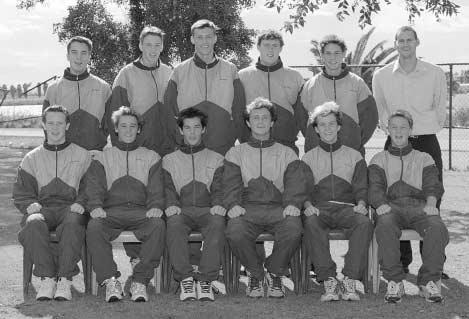
3 minute read
Society and Environment
This year has been a year of great change in S & E. The department continued its substantial development of the curriculum in Years Eight and Nine, adopting outcomes based approach using the Curriculum Framework. New teachers to Trinity in 2003 ideally
Mr Lucio Cicchini complemented the substantial
Head of Society and Environment expertise of the existing staff in the department. The integration of Information Technology into the S & E curriculum is a crucial aspect of the outcomes based approach we have adopted. This year, we placed an emphasis on providing Year Eight students with "active" learning opportunities. In Term Two, students developed their own dynamic web page that explored their family history.The standard of the web pages was excellent. Year Eight students also studied traditional Aboriginal history and culture. This included an excursion to the Hills Discovery Centre where students learned about bush-tucker and tool making. An aboriginal guest artist from Clontarf demonstrated artwork and provided the students with an opportunity to create their own artwork on wooden boomerangs. A number of other guest speakers visited the College to speak about a number of Aboriginal issues. The focus of the Year Nine curriculum is on Australia. Students studied various aspects of Australian history, the legal system and the environment. The Year Nine classes visited the Supreme Court as part of their law unit where they witnessed court cases and participated in a mock trial in the Francis Burt Law Centre. In Term Three, students explored a number of issues and concepts related to the use of money, budgeting and investment. The boys derived a great deal of enjoyment from this topic. Wemodified all the Year Ten S & E courses so that students could study the four TEE subjects available for study in Year Eleven - Economics, Geography, History and Politics. Each student studied each of the disciplines for a nine-week block. Students were in a better position to be able to select subjects for upper school because of their exposure to each of the disciplines. Students also benefited by receiving the necessary background to enter the respective upper school subjects.Year Ten students also experienced the rigors of two examinations at the end of each semester. Some Year Ten students also participated in the Australian Geography Competition achieving outstanding results. A large number of students undertook S & E disciplines in Years Eleven and Twelve in 2003.

One hundred students studied Economics in Year Eleven. This is testimony to the outstanding reputation that the subject has established at Trinity over a long period.Trinity had its first Year Twelve Political and Legal Studies in 2003 with twenty-five students doing the course. This subject has grown in popularity over recent years. Year Eleven Political and Legal studies students had the opportunity of visiting the Parliament of Western Australia. In August, a group of Year Eleven Accounting students had the opportunity of visiting the University of Western Australia. Students toured the facilities including the Commerce building and the library. Trinity old boys currently studying Commerce, Law and Arts gave talks and discussed the importance and relevance of school work in Years Eleven and Twelve.
Year Twelve Geography students experienced field trips covering different parts of the course. Students visited a bauxite mine and refinery near Pinjarra, a dairy farm near Brunswick and visited the town of Northam. Students studied the structure of Northam and the land use in and around the Town. Year Eleven Geography students had field trips to Herdsman Lake where students explored the nature of ecosystems and to Trigg beach where students enhanced their understanding of coastal formations. It has been a busy but rewarding year for S & E. We look forward to continued change and growth next year to improve further the high standards we have already established in our learning area.










